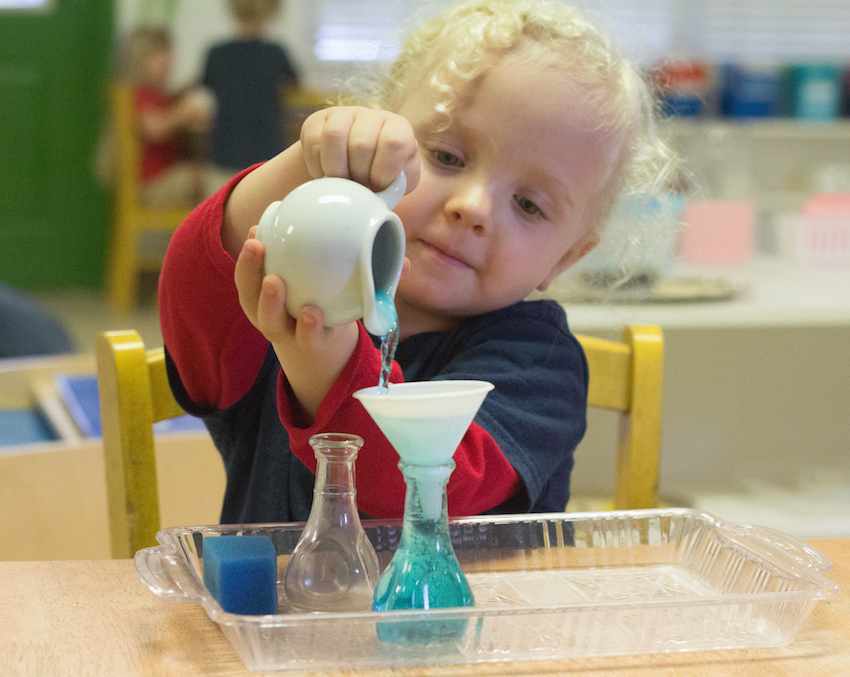“An adult works to perfect the environment, but a child works to perfect himself.” ~Maria Montessori
Dr. Maria Montessori recognized the vital importance of developing life skills in the young child, not only because the child craves and delights in them, but because when a young child can confidently take care of him or herself and the surrounding environment, he or she will be properly prepared to learn intellectual concepts.
Practical Life is regarded as the foundational area of the Montessori classroom and develops many essential skills and attributes necessary for later learning, including:
- Fine-motor Skills: through constant repetition of motions, the child strengthens his muscles, he perfects his coordination and gains confidence in a particular skill.
- Focus and Concentration: because Practical Life work is so enticing and requires precision and detail, it naturally fosters longer periods of focus within the child.
- Order and Sequence: the young mind is constantly organizing and categorizing information. Practical Life work supports the need for this and aids the child in exercising these skills physically and intellectually.
- Success: the young child becomes unafraid to “fail” and comes to understand that all true learning comes by returning to it over and over again.
- Responsibility and Respect: when a child is invited to participate in real life activities at a young age, he or she feels a sense of community with the world around them and will help to create a welcoming environment.

Practical Life Sequence
- Practical Skills: squeeze, transfer, scoop, pour, thread, twist/turn
- Grace & Courtesy: manners, making conversation, conflict resolution, precision of movement
- Care of Self: self-management, grooming and hygiene, dressing (zip, tie, button)
- Care of the Environment: sweep, wipe, scrub, polish; order, neatness, respect for equipment
- Art & Gardening: of special note below
Art: A Special Note
The foundation for art in a Montessori classroom is laid through many of the areas of learning, such as: Sensorial, Practical Life, Language, Math, Science and Geography activities. During the first three years of life, the child accumulates and stores information that later gives fuel to the imagination. Many children began to draw with individual and creative purpose around age three.
The period from 3–6 years should focus on experimentation, tools and processes, concentration, and coordination. During this stage, the emphasis on precise technique and end-products should be avoided. It is the experimental technique that is of most interest to the child; how a creative work is done, not subject or end product. As this stage, the child works through activity of the hand which builds the intellect and develops a base for creativity through both spontaneous discovery and trial and error.
During the early years, children are exposed to fine art, famous artists, and their techniques (when can be practically demonstrated) so the young child may gain an appreciation for the person and processes.
Art Sequence
(Including Multi-Area Integrated Lessons)
- Colors, Shapes, Textures
- Tools and Techniques: Punch Out, Scissors, Glue, Staple
- Coloring Mediums and Tools
- Exploration and Experimentation
- Genres and Artists
- Technique Exploration
- International & Historical Art

Gardening: A Special Note
In Montessori, gardening falls under the realm of Practical Life due to the “nature” of many of the activities.
Digging, smoothing, planting, watering, weeding, and harvesting are part of the activities children participate in. Children enhance and connect many concepts in real time in the Garden as well as from the Science area of the classroom. Care of the Environment takes on another level as students learn how to care for the plants and yard, and use the equipment such as child sized shovels, rakes, dowels, and buckets. Clean up includes washing and placing equipment to dry as well as replacing the Garden hose and sweeping off dirty shoes! The Garden has special appeal to students, as does all of real nature and is very important to their well-rounded development and learning about respect for all life, from the tiniest ant to the classmate nearby.
Garden Sequence
(Including Science Integrated Lessons)
- Identify and Name Plants
- Plant Parts and Cycles of Life
- Weather/Seasons
- Insect/Animal/Plant Food Chains
- Identify and Name Tools
- Proper and Safe Tool Use
- Care of the (Outdoor) Environment
- Respect for All Living Creatures